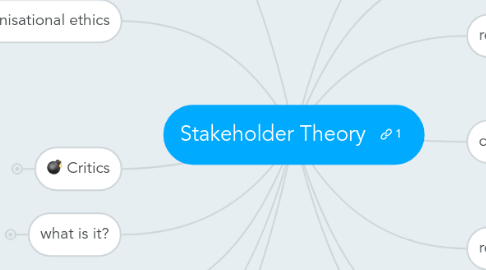
1. Controversial in America where shareholder have a big say in enterprises
1.1. not so in European
1.2. japan example
2. organisational ethics
2.1. why?
2.1.1. larger roles in society
2.1.1.1. health care
2.1.1.2. education
2.1.1.3. =friction betw
2.1.1.3.1. economics
2.1.1.3.2. shareholders
2.1.1.3.3. ethics
2.2. ethics and Stakeholder Theory
3. Critics
3.1. Far from being morally superior to the status quo, critics charge that stakeholder theory advo- cates the violation of strong moral duties.
3.1.1. Relationships between managers & shareholders have moral dimensions, because managers have fiduciary obligations to shareholders
3.2. stakeholder paradox
3.2.1. balance shareholders
3.2.2. Multi-fiduciary stakeholder theory claims that managers are fiduciaries to a number of stakeholder groups. This would require that managers concomitantly put the needs of shareholders above other stakeholders and at the same time place other stakeholder interests above shareholder interests, which is logically impossible.
3.2.3. Goodpaster, 1991
3.3. investor owned corporations
4. what is it?
4.1. characteristics
4.1.1. Stakeholder theory is conceived in terms that are "explicitly and unabashedly moral." 6
4.1.2. However, for stakeholder theory, attention to the interests and well- being of some non-shareholders is obligatory for more than the prudential and instrumental purposes of wealth maxi- mization of equity shareholders.
4.1.2.1. there are other normatively legitimate stakeholders besides equity shareholders.
4.1.3. three aspects
4.1.3.1. descriptive/empricial
4.1.3.2. intrumental
4.1.3.3. normative
4.2. in addition to employees, customers, suppliers you should also consider wider constiutents, analyse those groups and monitor and plan accordingly
4.2.1. in my view this just makes common sense at a business, project and programme level. there are have been some many examples of firms and their shareholder being directly affected by stakeholders
4.2.1.1. tram & shop keeper in edingurgh
4.2.1.1.1. TIE chairman David Mackay resigned in November 2010, describing the Princes Street section of the project as “hell on wheels”. Next to go was TIE chief executive Richard Jeffrey, who resigned in May 2011.
4.2.1.1.2. During a dispute between TIE and German contractors Bilfinger Berger in 2009, tram workers downed tools and halted the start of track laying in Princes Street.
4.2.1.2. niger delta spill example
4.2.1.2.1. also presence of activist organisations that support previously non-influential stakeholders e.g. stakeholderdemocracynetwork http://www.stakeholderdemocracy.org/
4.3. Edward Freeman Video on stakeholder theory
5. shareholder value theory
5.1. Milton Friedman, 1970, NY Times
5.2. is it a problem? really being pragmatic see later text
5.2.1. FIND LATER TEXT
5.3. yes is because it can make business to slow to respond to changing environment be that political, social, economic, technological. e.g. mcdonalds & Jamie Oliver, IT example that went bust? oil example from stakeholder news
6. Structure
6.1. What is stakeholder theory?
6.2. become important with examples
6.3. Why stakeholder approach?
6.3.1. contrast with shareholder value
6.4. critics of stakeholder theory
6.5. stakeholder theory in practice
6.5.1. US laws
6.5.1.1. "corporate constituency statutes" that make it permissible (but not mandatory) for corporate managers to take non-stockholder constituencies (stakeholders) into account.
6.6. diverse understandings
6.6.1. 9 categories or subsets of stakeholder theory
6.6.1.1. http://homes.chass.utoronto.ca/~jheath/stcg+pm.pdf
6.6.2. the literature on stakeholder theory has become vast and diverse.
7. Fiduciary Duty
8. Milton Friedman, 1970, NY Times article
8.1. http://www.colorado.edu/studentgroups/libertarians/issues/friedman-soc-resp-business.html
9. Interesting historical context
9.1. 1919 - Henry Gantt, business must be responsible or they will be taken over - in context of rise of communism
9.2. 1970 - Friedman - anything other than shareholder view is SOCIALISM
9.3. As D Mayer states in an online Encyclopedia of Business perceptions of the ethics of businesses & corporations have gone through several cycles in U.S. history.
9.3.1. The public perceptions of the ethics or [sic] business in general and corporations in particular have gone through several cycles in U.S. history, and further restrictions on U.S. corporations are unlikely as long as most Americans participate in economic gains. [assume author means ethics of business in general....] Read more: http://www.referenceforbusiness.com/encyclopedia/Sel-Str/Stakeholder-Theory.html#ixzz3VJR08Snj
9.3.2. indeed corporations in the first century of the United States were used for public purposes.
10. references
10.1. Stakeholder Theory & organisation ethics, Robert Phillips
10.2. Handbook of Research on Business Ethics and Corporate Responsibilities, Daniel Palmer, January 2015
10.3. http://www.referenceforbusiness.com/encyclopedia/Sel-Str/Stakeholder-Theory.html
10.4. Organising for Work, Henry Gantt,
11. definitions
11.1. fiduciary
11.2. paradox
11.3. normative
12. responses to critics
12.1. stakeholder legitimacy
12.2. create problem of stakeholder identity
12.3. principle of stakeholder fairness
12.4. look it is just sensible to consider interests of more than shareholders
12.4.1. BP example
12.4.2. McDonalds & Jamie Oliver
12.4.3. news article about recent oil company
12.5. stronger heuristically
12.5.1. http://www.readcube.com/articles/10.1111%2Fbasr.12024?
